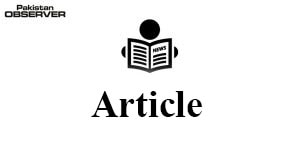Living in era of disinformation
THE term disinformation is defined as “false information deliberately and often covertly spread (as by the planting of rumours) in order to influence public opinion or obscure the truth”.
(Merriam Webster) The disinformation tool has been in practice since primitive ages where different groups employ misleading information to influence people at large. The primary objective of disinformation was to motivate own population and undermine morale of adversary.
Sun T Zu a renowned Chinese strategic thinker, suggested a great manifestation of disinformation as “Subdue enemy without fighting “.
The human being always endeavour for sustenance and growth by harnessing all means available to them. While other species, much stronger than human beings were withered away, The man continues to flourish.
After conquering natural domains land, sea, air and outer-space, the man had embarked upon to create a space to enlarge his influence and enable to command natural domains more sophisticatedly.
Thus the human-being created cyberspace. The cyberspace is defined as “the online world of computer networks and especially the Internet”.
(Merriam Webster) Since early 1990s, world has witnessed exponential growth of computers and allied technologies.
The internet has been evolved into a global platform, thus, undermining geographical boundaries. Pervasiveness of cyberspace has impacted society in manifolds.
The information revolution has facilitated swift information flow, better connectivity amongst people living in different parts of world and improved healthcare facilities irrespective of geographical distances etc.
However it has also given leverage to criminals to infiltrate privacy of individuals and carry out actions such as password hacking of emails and bank accounts, cyber bullying and propagate disinformation.
Now spreading of misleading information has become much easier due to ease of access to platforms such as Twitter, Facebook, Youtube, etc and low cost of cyber gadgets such as cellular phones, personnel computers, Wi-Fi connectivity.
The salient feature of information revolution is empowering a common man with information which was once domain of state institutions only.
The social networking sites are being used by hack activists (state and non-state actors) for their own gains.
Societies with different social fault lines and poor governance are more vulnerable to disinformation campaigns.
The Arab Spring also known as Facebook revolution is an example which led to instability and regime-change in the Middle East.
Recently, during COVID-19 pandemic, cyber criminals exploited the prevalent environment and tried to steal data and create chaos by sending fake messages containing harmful code to intended targets.
The societies which are more cohesive and where social values are guarded by different institutions and practising different norms can stay safe from onslaught of disinformation campaigns.
As a user of social media, one should remain cautious of the fact that the information on social media might be confirmed from official sources and veracity of information should be ascertained before forwarding. Pakistan is facing multiple challenges owing to its geostrategic location.
Pakistan, being a nation of 2200 million people, has the potential to rise and face these challenges successfully.
Pakistani nation has proved its mettle time and again. Response during pandemic, COVID-19 by Pakistani nation is remarkable and displays another character of this nation i.e. disciplined nation.
By overcoming fault lines of political, ethnic and religious differences, Pakistan can have better standing in comity of nations.
There is need that common man in general and leaders of the nation in particular should understand the motives of misleading information being propagated by different actors around the world. No information should be forwarded without ascertaining its authenticity.
—The writer is retired Wg Cdr, based in Islamabad.










